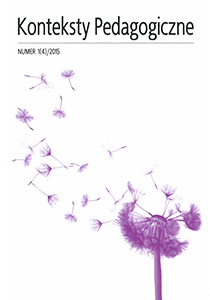Abstract
Regardless to applied philosophic orientation one emphasizes that interaction between teachers and students during the process of education should have the dialogical character. The course of communicative processes is largely a reflection of a teacher’s own beliefs on the essence of the teaching – learning process. The author of the following study tries to analyze factors that impact building of the space for co-existence and dialogue between teachers and students in everyday school practice.
References
Andrusiewicz P., Cele i różne formy dialogu nauczyciela z uczniami, „Ojczyzna – Polsz-czyzna” 1995, nr 2.
Barnes D., Nauczyciel i uczniowie. Od porozumiewania się do kształcenia, Warszawa 1988.
Bourdieu P., Passeron J.C., Reprodukcja. Elementy teorii systemu nauczania, przeł. E. Neyman, wstęp i red. nauk. A. Kłoskowska, Warszawa 1990.
Butrymowicz M., Tworzenie dwupodmiotowych sytuacji edukacyjnych jako warunek no-watorstwa nauczycieli klas początkowych, [w:] Nowatorskie tendencje w edukacji wczes-noszkolnej, red. J. Kida, Rzeszów 1998.
Danielewska J., Dialog edukacyjny – warunek pierwszy: zaufanie, [w:] U podstaw dialogu o edukacji, red. A. Karpińska, Białystok 2003.
Dymara B., Praca z małym dzieckiem. Wokół filozofii wychowania, Katowice 2008.
Freire P., Pedagogy of the Oppressed, London 2000.
Gadacz T.A., Wychowanie jako spotkanie osób, [w:] Człowiek – wychowanie – kultura. Wybór tekstów, red. F. Adamski, Kraków 1993.
Gołębniak B.D., Szkoła – kształcenie – nauczyciel, [w:] Pedagogika. Podręcznik akade-micki,cz. 2, red. B. Śliwerski, Z. Kwieciński, Warszawa 2003.
Klus-Stańska D., W nauczaniu początkowym inaczej, Kraków 1999.
Klus-Stańska D., Nowicka M., Sensy i bezsensy edukacji wczesnoszkolnej, Warszawa 2005.
Koć-Seniuch G., O kształtowaniu kultury komunikacyjnej współczesnego nauczyciela, [w:] Współczesność a kształcenie nauczycieli, red. H. Kwiatkowska, T. Lewowicki, S. Dylak, Warszawa 2000.
Kojs W., Działanie jako kategoria dydaktyczna, Katowice 1987.
Królica M., Dialog – wartość i metoda w edukacji małego dziecka, [w:] Komunikacja, dialog, edukacja. Część II, red. W. Kojs, R. Mrózek, przy współudziale Ł. Dawid, Cieszyn 1998.
Łaski A., O wychowaniu. Sentencje – myśli – aforyzmy, Warszawa 1999.
Rutkowiak J., Stosowanie teorii pedagogicznej w praktyce a dialog edukacyjny, „Kwartal-nik Pedagogiczny” 1986, nr 1. Szempruch J., Czynniki pedagogiczne warunkujące szanse edukacyjne uczniów klas po-czątkowych, [w:] Procesy uczenia się i ich uwarunkowanie, red. K. Bereźnicki, K. De-nek, J. Świrko-Pilipczuk, Szczecin 2005.
Szuman S., Rola działania w rozwoju umysłowym małego dziecka, Wrocław 1955.
Śnieżyński M., Sztuka dialogu. Teoretyczne założenia a szkolna rzeczywistość, Kraków 2005.
Tarnowski J., Pedagogika dialogu, [w:] Edukacja alternatywna – dylematy teorii i prakty-ki, red. B. Śliwerski, Kraków 1992.
Tischner J., Filozofia dramatu, Kraków 1998.
In accordance with the recommendation of the Ministry of Science and Higher Education, which aims to counteract the practice of “ghostwriting” and “guest authorship,” all authors submitting their text for publication should attach an author’s statement which declares the contribution of each of the authors to the article. The printed and signed statement should be delivered by mail or other means to editor-in-chief Joanna Skibska or sent in the form of a scan to the following e-mail address: redakcja@kontekstypedagogczne.pl. The authors will not receive remuneration for publishing their papers. The editors reserve the right to make minor editorial changes to the articles which will not affect the substance of the article. We encourage all authors to prepare their articles in accordance with the guidelines for manuscript preparation. Download pdf file.
Authors transfer all copyrights and grant the journal the right of first publication with the work simultaneously licensed under a Creative Commons Attribution License that allows others to share the work with acknowledgement of the work's authorship and initial publication in this journal. All authors agree to the publishing of their email addresses, affiliations and short bio statements with their articles during the submission process.

